|
|
|
Sort Order |
|
|
|
Items / Page
|
|
|
|
|
|
|
| Srl | Item |
| 1 |
ID:
064946
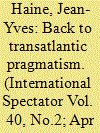

|
|
|
|
|
| Publication |
Apr-Jun 2005.
|
|
|
|
|
|
|
|
|
|
|
|
|
|
|
|
| 2 |
ID:
082728
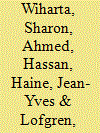

|
|
|
|
|
| Publication |
Solna, SIPRI, 2008.
|
| Description |
xvii, 139p.
|
| Standard Number |
9789185114573
|
|
|
|
|
|
|
|
|
|
|
|
Copies: C:1/I:0,R:0,Q:0
Circulation
| Accession# | Call# | Current Location | Status | Policy | Location |
| 053317 | 363.3480684/WIH 053317 | Main | On Shelf | General | |
|
|
|
|
| 3 |
ID:
090758
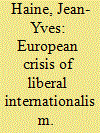

|
|
|
|
|
| Publication |
2009.
|
| Summary/Abstract |
The Liberal international agenda promoted by the European Union is in crisis. At a time when America is rediscovering the merits of multilateralism, engagement, and diplomacy, Europe is slowly acknowledging that its ethical and moral foreign policies have reached their limits. This article will review these issues with a special emphasis on military developments, and in particular, the European security and defence policy (ESDP) side of current EU external actions.
|
|
|
|
|
|
|
|
|
|
|
|
|
|
|
|
| 4 |
ID:
050886
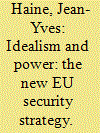

|
|
|
|
|
| Publication |
March 22,3003.
|
|
|
|
|
|
|
|
|
|
|
|
|
|
|
|
| 5 |
ID:
188805
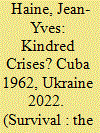

|
|
|
|
|
| Summary/Abstract |
There are numerous material differences between the Cuban Missile Crisis and the Ukraine conflict, and any comparison must be cautious. The international system is now multipolar, which makes the current conflict more complex and more global, but also potentially more tractable. The theory of nuclear deterrence has also become far more refined, and deterrence itself presumptively more stable. The Cuban Missile Crisis occurred in a very short time span, while the current conflict in Ukraine has been ongoing for one year and counting. One prominent similarity between the two crises is mutual miscalculation. In addition, both crises involve a risk-courting personalist dictator. Furthermore, Russian President Vladimir Putin’s willingness to flirt with nuclear brinkmanship, much like Nikita Khrushchev’s in 1962, raises the question of his rationality. The paramount lesson for the Ukraine crisis from the Cuban one may be the necessity of dialogue.
|
|
|
|
|
|
|
|
|
|
|
|
|
|
|
|
| 6 |
ID:
141280
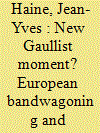

|
|
|
|
|
| Summary/Abstract |
The transatlantic partnership needs to be reassessed. Since the end of the Cold War, Europe has chosen to bandwagon with the United States and to outsource its security to Washington. Bandwagoning has serious consequences when the use of force is at stake: it may lead to entrapment, where weaker allies may be involuntarily dragged into a conflict. It may also lead to abandonment, where the dominant ally may choose to discard their vital security concerns. With the evolution of the international system towards a multipolar configuration, this strategy of bandwagoning is becoming increasingly costly for Europe while the dominant power, the United States, is progressively confronted by other competitors at the systemic level. These classic dilemmas attached to an asymmetric partnership are exacerbated in a multipolar configuration. In particular, the abandonment scenario may become more and more frequent precisely because there is competition—and thus potential costs—at the international level: the United States may leave Europe alone, not by choice but by necessity. The current crisis in Ukraine illustrates this shift: while some American leaders were keen to escalate the conflict by arming Ukraine, the Obama administration's commitment to the defence of Europe has been minimal and it has largely delegated the management of the crisis to the Europeans themselves. Washington had other and more important priorities. Strategic autonomy is not an option for Europe; it has become a reality, a Gaullist moment where Europeans will have to learn to think and act strategically for themselves.
|
|
|
|
|
|
|
|
|
|
|
|
|
|
|
|
|
|
|
|
|